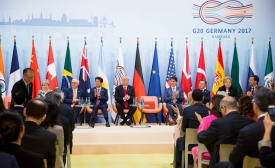international relations
The Qatar crisis raises two issues in the field of international relations today. The first is to disprove the mainstream Cold War-era view that small states cannot play a significant role in global affairs. The second is that big powers always use hard means to take control of ambitious, small states in order to preserve the status quo.

Shaun Riordan discusses how the importance of the G20 summit goes beyond its communique.
We must end the obsession with creating new “types” of diplomacy. [...] No doubt such concepts are useful for securing academic funding and publication in academic journals. But they are frequently conceptually confused, risk these new kinds of diplomacy being seen as an end in themselves, rather than as part of broader diplomatic strategies, and, more seriously, risk emptying the concept “Diplomacy” of any meaning.
A strategic approach which protects the Gambia interests must be the ultimate goal of the government. Although reciprocity and sovereign equality is the basis on which states interrelate to each other, hegemonic powers tend to use their superior economic capabilities as bargaining leverages to attain better deals at the expense of developing economies. This starkly reminds us that international politics is a deadly complex business which requires a clear-cut thinking strategy to mitigate the brute forces of material power.
In the last 10 years, in light of China’s rise, the resurgence of Russia on the world stage, and the proliferation of non-state actors in the Middle East, the concept of soft power has taken on renewed significance. Definitions of it abound and expansions of the examples and explanations of its various forms are offered from across the academy. [...] The other major change affecting soft power definitions and policies is technological innovation.
South Korea and Africa’s exchange of ideas and experience can go further. An avenue which would allow the fulfilling of both the cultural and economic aspirations of the relations could be the formation of sister-cities; pairing each of South Korea’s major cities’ governments with those of Africa and forging a kind of ‘Mayoral Korea-Africa Forum’ as well accompanying that with population exchange programmes.

Deadline extended to June 30 to apply for one of these prestigious grants.







